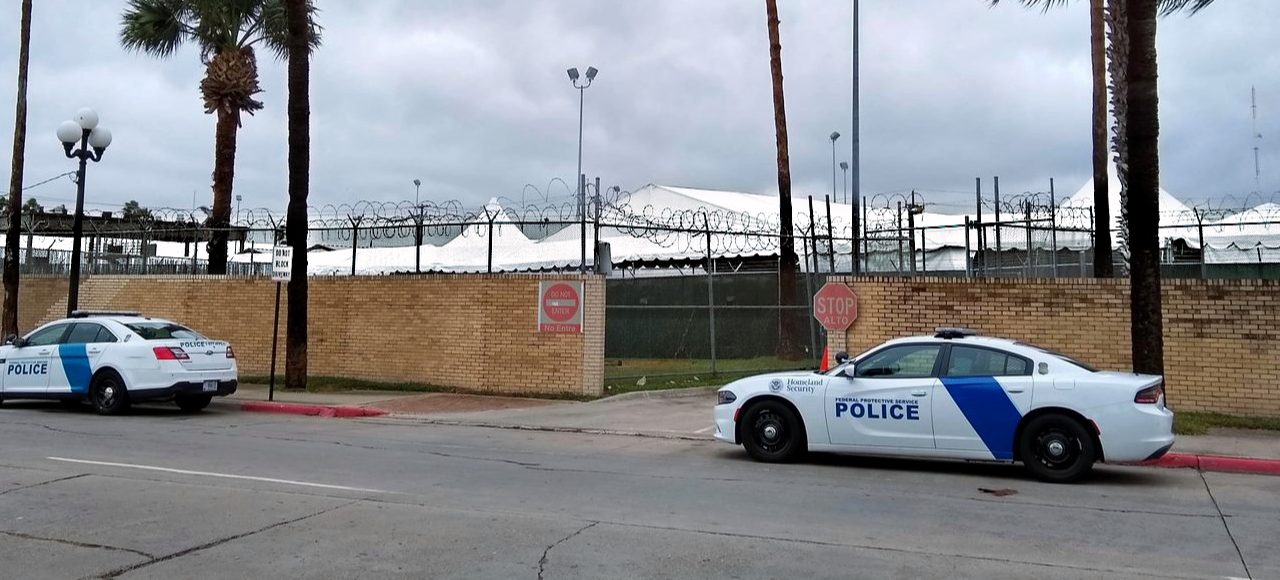Nearly 60,000 people seeking asylum in the United States have been returned to Mexico to wait for their U.S. court hearings under the Migrant Protection Protocols (MPP), also known as the Remain in Mexico program. Last week, I traveled to South Texas to observe the effects of the Trump administration program firsthand.
Those subjected to MPP are forced to wait—often for months—for each hearing date in one of the six Mexican cities participating in the program. When their hearing date finally arrives, they must present themselves at the port of entry as early as 4:30 a.m., despite the increased risk of danger in border cities at night. The people I saw had been waiting in the Mexican city of Matamoros, a location notorious for its high crime rate.
Each day, approximately 300 individuals are brought directly to tent courts, or “port courts,” in Brownsville, Texas. After their hearing, they are sent back to Matamoros without ever leaving the secure perimeter of the port of entry. Judges never visit the tent courts—instead they hear cases from brick and mortar courts in other locations by video teleconference (VTC).
By law, all immigration courts must be open to the public. However, attorneys and advocates have been repeatedly denied entry to these port courts. We attempted to enter one of these courts in Brownsville to observe MPP proceedings, but despite providing two weeks advanced notice, all members of our group were denied access. We were told that the denial was inevitable due to the secure nature of the facility.
However, this seems to be by design. In Laredo, Texas the Department of Homeland Security (DHS) declined the local government’s offer to lease an office building outside the port of entry for only $1. By declining the request, DHS kept their facilities exclusively on federal land. This is the department’s excuse for not letting us into the courts in Brownsville as well—yet this is still a violation of the law.
We were permitted to watch the hearings only from the Port Isabel and Harlingen courts, where the judges preside. Even in Port Isabel, it took us an hour to gain entry despite prior written approval. There is much that we still do not know about these court hearings, such as what goes on before and after the VTC is transmitting.
What I did see was greatly concerning. The judges ordered the deportation of everyone who did not show up to their hearing, without knowledge of the reason for their absence. A recent report documented the high rates of violence, unemployment, and homelessness experienced by asylum seekers in MPP, which can all make court attendance difficult or impossible.
None of the people I saw had attorneys. Most seemed overwhelmed and confused by the hearings, as would anyone who does not have experience in U.S. asylum law. Overall, only about 1% of those in MPP are represented by an attorney.
Judges told asylum seekers in these hearings to return to court in March or April 2020 with an asylum application and evidence of their persecution, all translated into English. This seems like another impossible task.
Many people in the MPP program are living in a tent camp immediately outside the port of entry. We heard from attorneys who are too afraid to cross the border. The few attorneys who do go are overwhelmed by the large number of people needing legal services.
It will be extremely difficult for any of the people I saw in court to prepare the necessary documents. Even if they do, they must live in dangerous conditions for months until their next court date, at which point they will be scheduled for yet another court date.
MPP allows for exceptions for people who are in certain vulnerable categories. However, attorneys told us that even people with serious medical conditions are often not allowed to pursue their cases from within the United States. Those who are afraid to stay in Mexico are often denied the required non-refoulement interviews, and only about 5% of those interviewed are removed from the program.
While only Laredo and Brownsville have tent courts, the situation is otherwise similar in other MPP cities. This week, advocacy organizations are joining together for an MPP Week of Action. Greater awareness of this program is necessary to ensure meaningful accountability and oversight.
FILED UNDER: U.S.-Mexico Border


